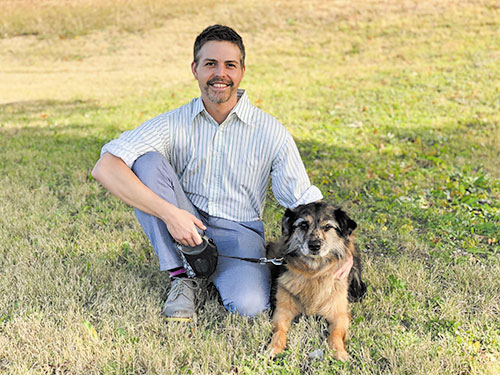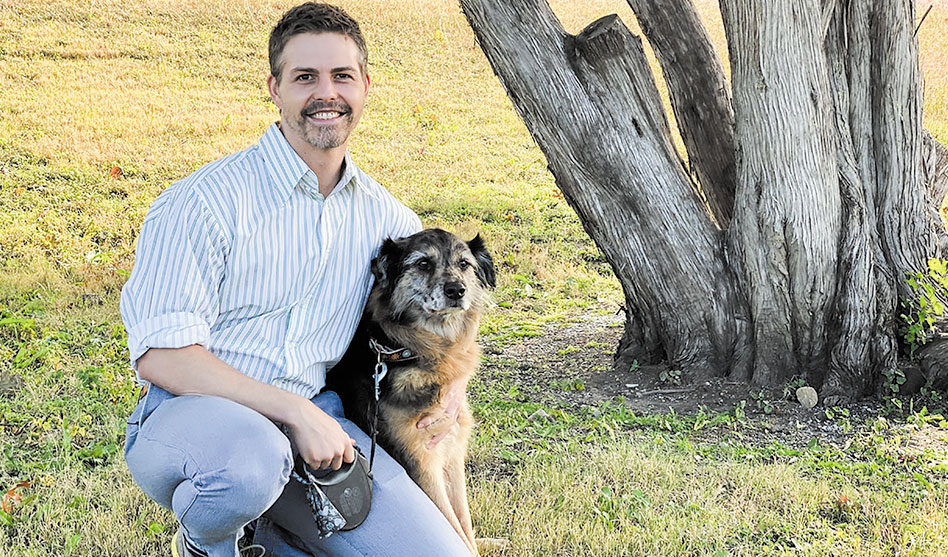Keaton Johnson created the All Children All Families program for Dallas CASA.
(Photo courtesy of Roseanne Lewis)
CASA program open to LGBTQ volunteers
DAVID TAFFET | Senior Staff Writer
taffet@dallasvoice.com
The Human Rights Campaign has recognized Dallas CASA for LGBTQ inclusion. Keaton Johnson wrote the action and implementation plan and helped coordinate the changes for the All Children All Families Benchmarks of Inclusion program that HRC honored.
CASAs, or Court Appointed Special Advocates, work with children who have been removed from their families.
They’re appointed at the initial court appearance and stick with their children until they have found a safe and permanent home, Johnson said.
While all sides in a court battle have attorneys and overburdened caseworkers, the CASA is there to make sure the best interests of the children are represented. And each CASA is assigned to just one case at a time. So judges often rely on the CASA for information on how the children are doing — educationally, medically and legally.
Johnson said through the course of any court battle involving children, caseworkers can change, and each one covers a huge number of cases. And attorneys for the parents are mostly focused on restoring custody for their client.
But the CASA is the one person consistently there for the specifically child.
All Children All Families is a project to make sure all families who participate in the foster program are prepared to accept and love all children, including LGBTQ kids. And, of course, LGBTQ CASA volunteers are very welcome.
Since any child might come out while in foster case, Johnson said All Children All Families prepares foster parents for that possibility. While it would be nice to match LGBTQ foster parents with LGBTQ children, that’s not always possible, especially with younger children. So, Johnson said, the goal is to make sure every foster family is culturally competent on LGBTQ issues.
 He explained the process to become a CASA: First there’s a one-hour information session that anyone interested may attend. That session begins with a series questions and answers, and sometimes one quick question is all it takes rule someone out as a CASA volunteer.
He explained the process to become a CASA: First there’s a one-hour information session that anyone interested may attend. That session begins with a series questions and answers, and sometimes one quick question is all it takes rule someone out as a CASA volunteer.
For example, potential volunteers often as if they would need to be available during the day for court hearings. The answer is yes. And for a few months, it may entail one hearing per month. What if you’re available for most hearings but need to miss one? That’s when a CASA supervisor, like Johnson, would step in and present the judge with any information you have.
Once someone decides they’re interested, they have to go through a screening process and interviews. After being accepted, they go through a month of training.
Can a couple become CASAs together and be assigned to the same case? Yes. Can same-sex couples become CASAs together and be assigned to the same case? Absolutely.
Can parents object to their child or children having an LGBTQ CASA? It would be in the parents’ best interests not to object to a whole lot after they’ve already had their children removed from their home.
How do CASAs develop a relationship with the child?
“By just showing up,” Johnson said.
The CASA and children talk outside the courtroom. Sometimes they’ll go get something to eat together. Johnson said he’s even seen some CASAs take their children to the State Fair or a movie, but that needs to be arranged with the foster parents.
Being a CASA, Johnson explained, is all about building relationships to make sure the child has a voice in the courtroom.
“CASAs learn to tap into all the resources out there,” Johnson said, such as medical information. The CASA is appointed by the court and therefore has access to the child’s medical records. Johnson said many of the infants in the system were born testing positive for drugs. The CASA has the right to see those test results and the responsibility to monitor the baby’s progress.
In cases of physical abuse, the CASA has the ability to follow the child’s medical treatment as well as any counseling or other therapy needed.
The CASA writes a report to the judge, who may have a few additional questions.
Dallas CASA was founded in 1979 as one of three pilot programs around the county. Texas now has 72 CASA programs around the state with hundreds more across the U.S.
Johnson has been with CASA three years. He said his office encouraged him to write the All Children All Families proposal because of his experience in LGBTQ advocacy and empowerment.
As a graduate student, he did a needs assessment study for Texas Pride Impact Funds to help that organization get off the ground. After graduation, he worked with Resource Center’s Nelson Tebedo Clinic in its HIV prevention program.
Johnson said he always loves working with LGBTQ volunteers because they prioritize inclusion and are good for kids.
The goal is for all children removed from their homes to have a CASA. Currently, Johnson said, there’s a placement crisis. And laws in Texas allow money for placement agencies be allocated to religious organizations that may discriminate against LGBTQ children and potential foster and adoptive parents.
Johnson said he worries about those LGBTQ youth who face stigma, hostility and aggression.
He called the system, “a little bit of a mess.” And with current Texas laws that prioritize unborn fetuses over the needs of already born children, it’s likely to get worse.
Find more information on becoming an advocate for foster children through the CASA program at DallasCASA.org.












